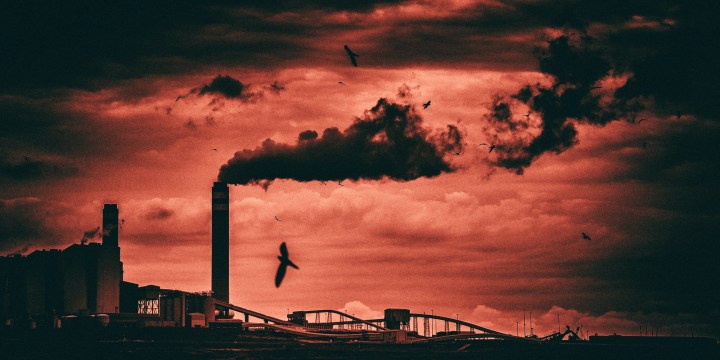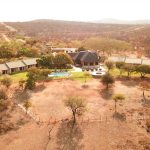2020 in Review
Polluter of the Year: The South African government

In 2020, as activists faced assassination and threats, environmentalists across South Africa woke up to the reality that they were at war with their own government: our executive branch had become a primary facilitator of ecosystem collapse. The conservation of our natural heritage is now entirely in our own hands.
First published by Daily Maverick 168 weekly newspaper
“Conservationists have to win again and again and again,” the environmentalist David Brower once said to the journalist John McPhee. “The enemy only has to win once.”
At the time, Brower was known to the United States government as the most militant conservationist in the nation. He had blocked the construction of dozens of dams across the length and breadth of the country, he had spearheaded campaigns that led to the establishment of multiple national parks, and he had pushed through the passage of the Wilderness Act, which would protect millions of acres of public land from exploitation and abuse.
But back in the early 1970s, when Brower said these words to McPhee — who would quote them in his classic work of environmentalist non-fiction, Encounters with the Archdruid — the global biosphere wasn’t yet teetering on the brink of collapse. Militancy, as it applied to conservationists, didn’t yet include the regular storming and boarding of oil rigs, nor did it result with such frequency in the murder of the so-called “militants” themselves.
And so Brower may have been demonstrating a latent aptitude for prophecy in what he said to McPhee next: “We can’t win. We can only get a stay of execution.”
In South Africa in 2020, that stay of execution ended abruptly for Fikile Ntshangase on 22 October, when four gunmen entered her home and shot her dead. The 65-year-old grandmother was described by various media reports as a “vocal opponent” of the expansion of the Somkhele coal mine, which would further decimate the quality of the air, soil and water in her rural village in KwaZulu-Natal. But Ntshangase, to those who had ordered her killing, was most definitely a militant – to wage war, as history has repeatedly shown, the aggressor is obliged to employ war’s divisive terms.
Between whom, then, was this new South African war being fought? In the weeks immediately following Ntshangase’s murder, the question spread like mercury through the veins of the country’s environmental movement. In mid-November, when Xolobeni anti-mining activist Nonhle Mbuthuma received a death threat via SMS, the answer was clearer. The 2016 murder of Mbuthuma’s colleague, Siphokise “Bazooka” Radebe, had never been properly investigated, and neither would the murder of Ntshangase be. The enemy, it seemed, was none other than the South African state.
Of course, though the intransigence of the South African Police Service on a few high-profile murders could hardly prove the argument; what this line of thinking had going for it was the broad and recent context. Since the start of 2020, the consistent message of the government to local conservationists had been that the battle would continue to heat up. In terms of the government’s mounting disregard for the section 24 rights of every South African citizen — “everyone has the right to an environment that is not harmful to their health or wellbeing” — the year kicked off with predictable stalling on the Deadly Air matter from the lawyers for the state, who were loath to file answering affidavits on why the energy infrastructure on the Gauteng and eastern Mpumalanga highveld was still causing as many as 650 early deaths per year.
As far back as 2007, it turned out, the government had admitted that the air pollution in this region was in dangerous breach of the levels defined in the Air Quality Act of 2004. As the court papers filed in June 2019 pointed out, the source of the lethal air had for more than a decade been unmistakable: 12 of Eskom’s coal-fired power stations were located here, as well as Sasol’s coal-to-liquid refinery in Secunda.
Given the mounting death toll, which international experts had directly attributed to the “particulate matter pollution” from these facilities, the court papers demanded urgent and immediate action. On the first page of the 522-page founding affidavit, prepared by the Centre for Environmental Rights on behalf of groundWork and the Vukani Environmental Justice Movement in Action, the “Notice of Motion” gave the Department of Environment, Forestry and Fisheries (DEFF) six months to comply with its own standards, as set down in the “Highveld Plan” of 2012.
South Africa’s environmental legislation is among the most progressive in the world, but the ANC government’s non-enforcement (and even dismantling) of that legislation puts the state among the worst polluters in the world.
By early 2020, it was clear that Minister Barbara Creecy had no intention of obeying the order. Not only was the state refusing to answer to a matter in which the president himself was named as a respondent, it was also using the cover of Covid-19 to render the air quality in the region even worse. On 27 March 2020, with the country barely 24 hours into hard lockdown, Creecy gazetted sulphur dioxide (SO2) air pollution standards that were twice as weak as the previous standards.
Four days later, the Centre for Environmental Rights, whose lawyers had been working on the Deadly Air matter for more than three years, put out a bracing statement:
“Research presented by the Life After Coal Campaign to the Minister and the Department has shown that 3 300 premature deaths would be caused by doubling the SO2 standard just for Eskom’s coal-fired power stations, as a result of increased risk of lower respiratory [tract] infections, increased risk of stroke, and increased risk of death from diabetes.
“The weakening of the standard makes South Africa’s 2020 SO2 standard – which exists to protect people’s health and human rights – about 28 times more lax than in China, and 10 times weaker than India’s.”
South Africa’s environmental legislation is among the most progressive in the world, but, the centre implied, the ANC government’s non-enforcement (and even dismantling) of that legislation puts the state among the worst polluters in the world.
Also, speaking of China, the South African government appeared to be in great company. In early April 2020, Daily Maverick published an investigative feature that outlined the terms of the deal, as well as the development plans, that set up a 8,000ha Special Economic Zone (SEZ) in the far north of Limpopo province. Known as the Musina-Makhado SEZ, the dealmakers behind the R145-billion China-funded project had kept many secrets from the ancestral claimants to the land, including their unholy plans for a 3,300-megawatt coal-fired power station.
Aside from the devastating ecological impact the project would have on the Limpopo River Basin, upon which millions of Africans from four sovereign nations depended for their livelihoods, we also noted that the Department of Trade and Industry (DTI) had on 15 September 2017 awarded the SEZ operator permit to a Chinese-owned company called the South African Energy Metallurgical Base (Pty) Ltd. As it happened, the Zimbabwean police “through Interpol” had issued an arrest warrant for the company’s chairman, Mr Ning Yat Hoi, in the very same month that the permit was granted.
But, like DEFF in the Deadly Air matter, the DTI was unrepentant. Perhaps it was enough for the DTI that Ning had denied the fraud allegations in a letter from his lawyer to Daily Maverick, because not only would the department ignore our questions regarding Ning, it would double down on its plans for the SEZ.
In mid-November 2020, Daily Maverick published a follow-up feature in the SEZ series, wherein we investigated the circumstances behind the mooted provision of water to the project from four Zimbabwean dams. At an estimated water use of 80 million cubic metres per year, the Musina-Makhado SEZ would by all accounts be incredibly thirsty – and yet the draw-down from these dams, according to Minister Lindiwe Sisulu of the Department of Human Settlements, Water and Sanitation, would still “benefit both countries”.
What Sisulu had failed to acknowledge, in the set of questions that had been put to her in Parliament in June 2020, was the impact on the ordinary citizens of Zimbabwe. Because, in the context of climate collapse and the multi-year Zimbabwean drought, even the compilers of the Draft Environmental Impact Assessment (EIA) for the SEZ – which would be released for public comment in September 2020 – had to admit that the project was a terrible idea.
In order to understand the full effect of climate collapse on Zimbabwe’s water resources, their model looked at worst- and best-case carbon emission scenarios – and, either way, their equations added up to disaster.
“It is predicted the mean annual precipitation will decline in the region of between 12% for higher mitigation emission scenarios and 16% for lower emission mitigation scenarios by 2050,” the Draft EIA noted, with reference to the two dams that had been earmarked for short- and medium-term use. “This significant uncertainty related to water supply poses a major risk to the SEZ.”
But then risk, when it came to environmental breakdown, was no longer something the South African government seemed to care about — not for its own citizens, and even less for citizens of other countries.
To refer back to David Brower, the conservationists would just have to keep winning “again and again and again”. Tragically, as the evidence of 2020 shows, the stay of execution was over. DM168




















 Become an Insider
Become an Insider
Neoliberal capitalist short term agendas at the behest of South Africa’s blesser which is China.
“Neoliberal capitalist”? You nuts! The anc is a “neocommunist anticapitailist”!
We can only weep, it seems
Weeping is appropriate, and then it’s to the Constitution and the courts we must turn.
It is a pity that many in our government still seem to hold a view that economic progress and employment are dependent on heavy industrialisation, of the coal-steel-concrete variety, building on what is called the ‘national wealth in the ground’, i.e. mineral resource exploitation. And if that has to come at some ecological damage, so be it. It is the old and false dichotomy of ‘environment vs. development’. We are now increasingly seeing much cleaner, ‘ligher-touch’ technology becoming available. But in political economy terms, the players of the old regime remain powerful and are lobbying hard for their interests. To facilitate sustainable development, ‘environmentalists’ need to not only put up barricades again and again against such damaging industrialisation, but also embrace, facilitate and advocate for adoption of clean technology. The more it’s used, the easier it becomes the preferred choice to deliver socio-economic benefits.
The priority for DEFF and Barbara Creecy is certainly not conservation of our unique environment and wildlife. Their sole aim is to extract as much “rent” as possible for their ANC cronies and themselves. Look at the farce in KZN where the Board of Ezemvelo is suspended due to corrupt activities. Look at the fact that we are the only country in the world that permits domestic trade in rhino horn which facilitates the decimation of our rhinos. Look at the fact that canned lions are still being bred for their bones. The ANC and Barbara Creecy disgust me. Our only hope of preserving our unique natural heritage is through the fight that the ethical NGO’s put up against DEFF.